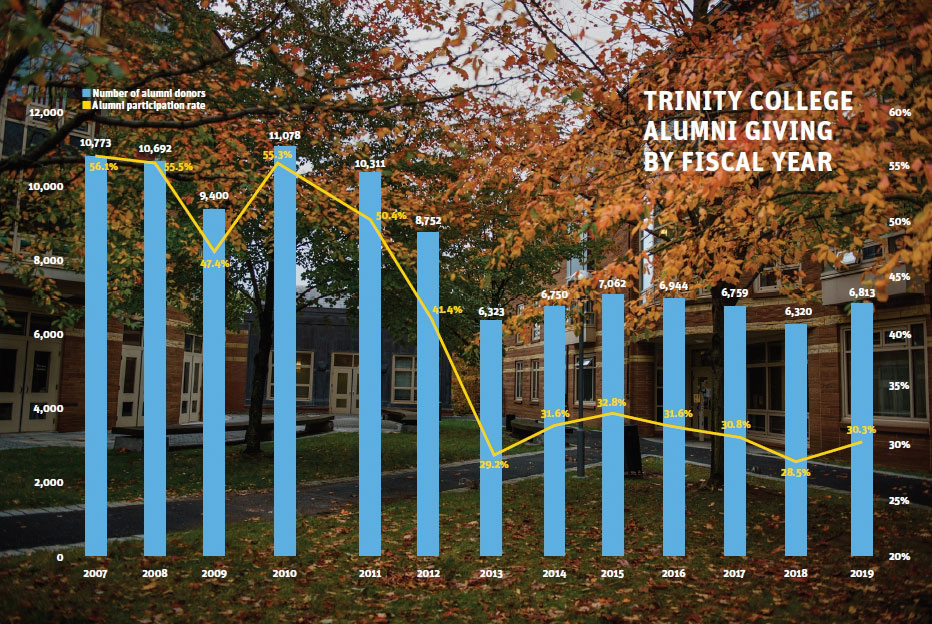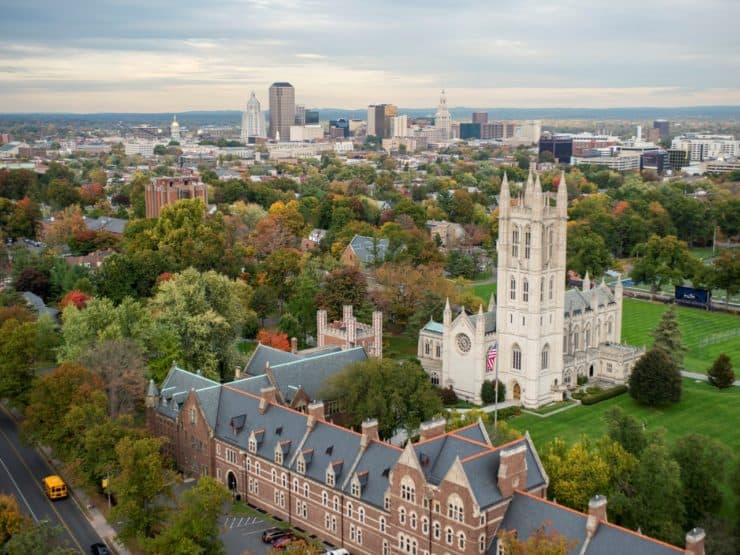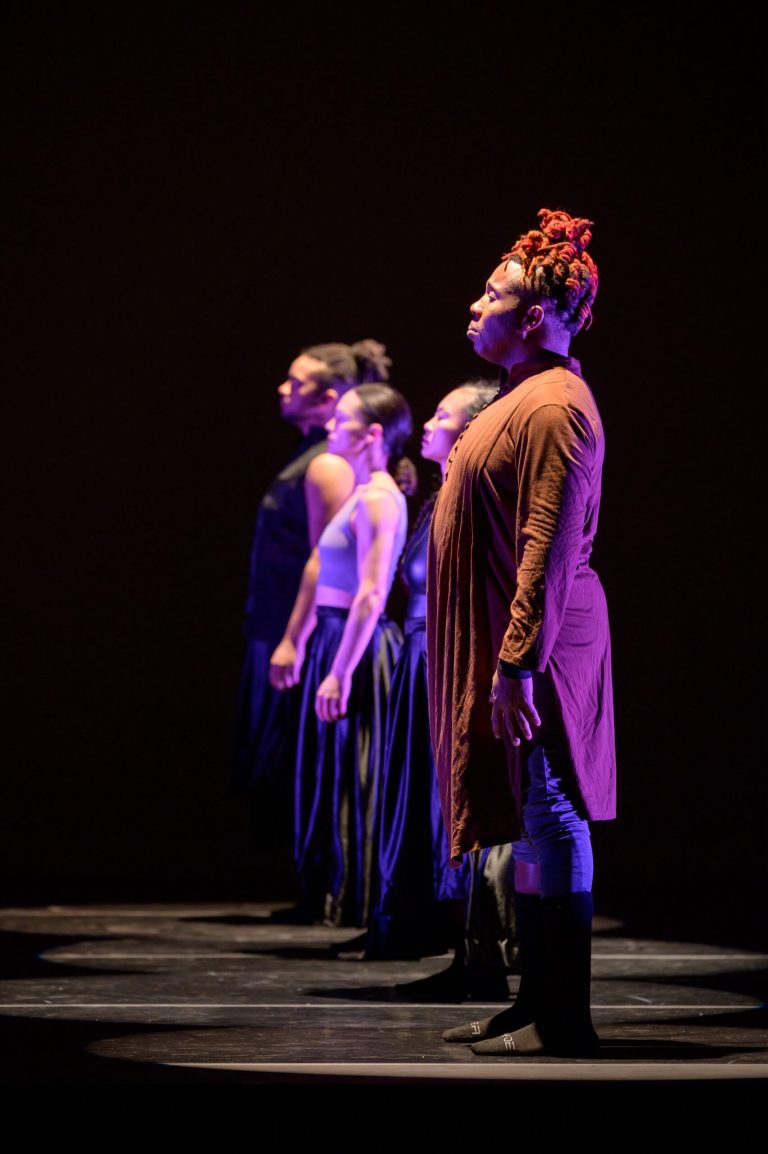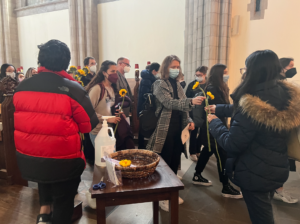Olivia Silvey ’25
News Editor
President of the College Joanne Berger-Sweeney sent an email to the Trinity College community on Thursday, Feb. 17 providing an update on the February Board of Trustees meeting. The Trustees discussed Ologie’s brand assessment, the Trinity Athletic Giving initiative (TAG), multiyear financial planning, and the Class of 2026.
Ologie, a branding and marketing agency currently reviewing the College’s visual identity and platform, presented its comprehensive brand assessment to the Trustees. Vice President of Strategic Marketing and Communications Hellen Hom-Diamond told the Tripod via email that the brand assessment is a part of an ongoing project that will “help the College refine how it expresses its distinctiveness, strengthen its overall visibility, and articulate its positioning as a first-choice destination for students, faculty, and staff.” Hom-Diamond indicated that the brand articulation Ologie produces will serve as the foundation for how the College expresses itself in admissions, advancement, and marketing.
In January, the College sent out a survey to evaluate a variety of promotional materials produced from Ologie. Hom-Diamond told the Tripod that the survey was specifically sent to current members of the community, prospective students, and external college counselors. “The concept resonated more strongly with counselors, current and prospective students and families than it did with our faculty/staff and alumni. The feedback we heard has been extremely helpful in guiding the next iteration, which is currently in process” said Hom-Diamond.
Members of “Alumni For A Better Trinity College,” a Facebook group which includes 2,400 members, were disappointed with the branding materials featured in the Ologie survey. Under a discussion post with 83 comments, many alumni criticized the bland and generic appearance of the marketing materials developed by Ologie. Others commented that the College should promote its history, high Return on Investment (ROI), and the social benefits of the Trinity community for students and graduates.
“It’s rare to see work this poor. It has no value whatsoever. Trinity shouldn’t even pay for this. It’s that bad. But if we want to look like the dumbest people in the room, go for it,” commented one of the moderators of the group. They also highlighted the similarities between the promotional materials Ologie developed with those advertised by the University of Pennsylvania. “Athletics and extracurriculars weren’t even mentioned, wtf,” commented another alumnus who received seven likes.
Hom-Diamond told the Tripod that the College will use the brand assessment to develop a creative platform that incorporates language, aesthetic guidance, and visual identity components. She also indicated that the College plans to share more about the work later in the spring.
General Counsel and Secretary of the College Dickens Mathieu, who provides advice and support to the Board of Trustees, declined to provide the Tripod with a copy of the brand assessment and referred questions to Hom-Diamond.

Regarding the TAG initiative, which was open from Jan. 31 through Feb. 7, Berger-Sweeney announced in her email that Trinity exceeded its donor participation and dollar goals of $1.2 million. The College has raised $239 million towards the Bicentennial Comprehensive Campaign which is 48% of the goal. In March 2021, Vice President for College Advancement Michael Casey told the Tripod that Trinity had raised $196 million towards the Campaign. In September 2020, Trinity had raised $182 million with $64 million of this total collected from November 2019 through September 2020.
Alumni giving participation has been on the decline since 2007. According to a fall 2019 edition of The Trinity Reporter, a publication produced by the College, 56.1% of alumni participated in 2007, 41.4% in 2012, and 28.5% in 2018. The Reporter attributed the period from FY11 through FY13, during which the College lost 40% of donors, to the controversy surrounding the Building the Social Community and Trinity White Paper under the leadership of then President Jimmy Jones. The white paper advocated for requiring fraternities and sororities to become coed meaning that they would lose their national charters. The recommendation was met with anger and in 2015 the Board of Trustees, in consultation with Berger-Sweeney, rescinded the coed mandate “but the damage had been done.”

In October, Trinity’s Executive Director of Alumni, Family, and Giving Kerry Smith told the Tripod that the Trinity College Fund (TCF) experienced a decrease in donors from 6,288 (27.3%) in FY20 to 6,080 (26.1%) in FY21–the lowest numbers since 2007. However, Smith indicated that in FY20 the College raised $13.3 million between the TCF, the Student Emergency and Equity Fund (SEEF), and current-use financial aid contributions and current use contributions to athletics–a 30% increase from the previous year and the second-highest in the New England Small College Athletic Conference.
Berger-Sweeney’s multiyear financial planning update included the development of the next multiyear budget model from FY23 through FY26. She noted that the Class of 2025 is a smaller class and has a greater financial need than past classes while also being stronger academically than previous classes. Berger-Sweeney attributed the decline in applicants for the Class of 2025 to other institutions implementing a test optional application and an overall decrease of applications to private institutions nationwide.
Berger-Sweeney stated in her email that the applicant pool for the Class of 2026 increased to 6,155 applicants, a five-year high, with increases in student quality, international students, U.S. students of color, and athletes. Vice President of Student Success and Enrollment Management Joe DiChristina told the Tripod in late February that ED II applicants have until the end of the month to finalize their decisions. He indicated that the College will provide an update regarding the Class of 2026 to the Office of Communications the week of Mar. 7.







Joseph Troiano: After World War Two, Trinity College decided to offer returning veterans with federal funding from the G I Bill the chance to live at home off campus and attend classes at the school.
These students would receive no housing, no student services, no equal treatment with the wealthy students who would continue to be Trinity’s reason to exist.
A generation later, this bifurcation of the student body still existed. The brightest children of such veterans could be admitted to the school as financial aid students with the rights and privileges of resident students in theory only. They could not change the school’s bias toward the slacker unacademic children of the wealthy and their organizations that protected the status quo.
The fraternities had copies of every weekly quiz from math professors who refused to change them year to year. Athletes had tutors with similar materials, and when a frat brother blew off a major test with no better excuse than pledge activities, trustees of the college intervened with administration on the students behalf.
My father grew up in Hartford, fought from Guadalcanal to Okinawa then fathered eight Italian American children. My stellar SAT scores and a strong academic record got me into Trinity, but as the son of a house to house soda distributor I was never accepted by the majority of Trinity’s administration or students.
I was welcome to lead class discussions, write papers that demonstrated my mastery of the English Language, and excel academically. However, the day I could take no
more of the social side of Trinity College and withdrew as a student, the form had a two inch space for me to explain why I was leaving. No trustees weighed in.
My mother, who also grew up as an Italian American in Hartford said to me, “I knew you didn’t belong there with those people.” That was all the motivation I needed to return to Trinity, graduate, and touch the book at graduation with my middle finger.
As a school counselor in the Hartford Public Schools for fourteen years I was never shy about speaking the truth about Trinity College. I pledged 1% of my income to Trinity payable once single sex organizations were banned from campus. I have had no response to that pledge in 37 years.